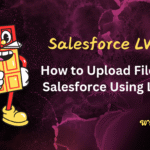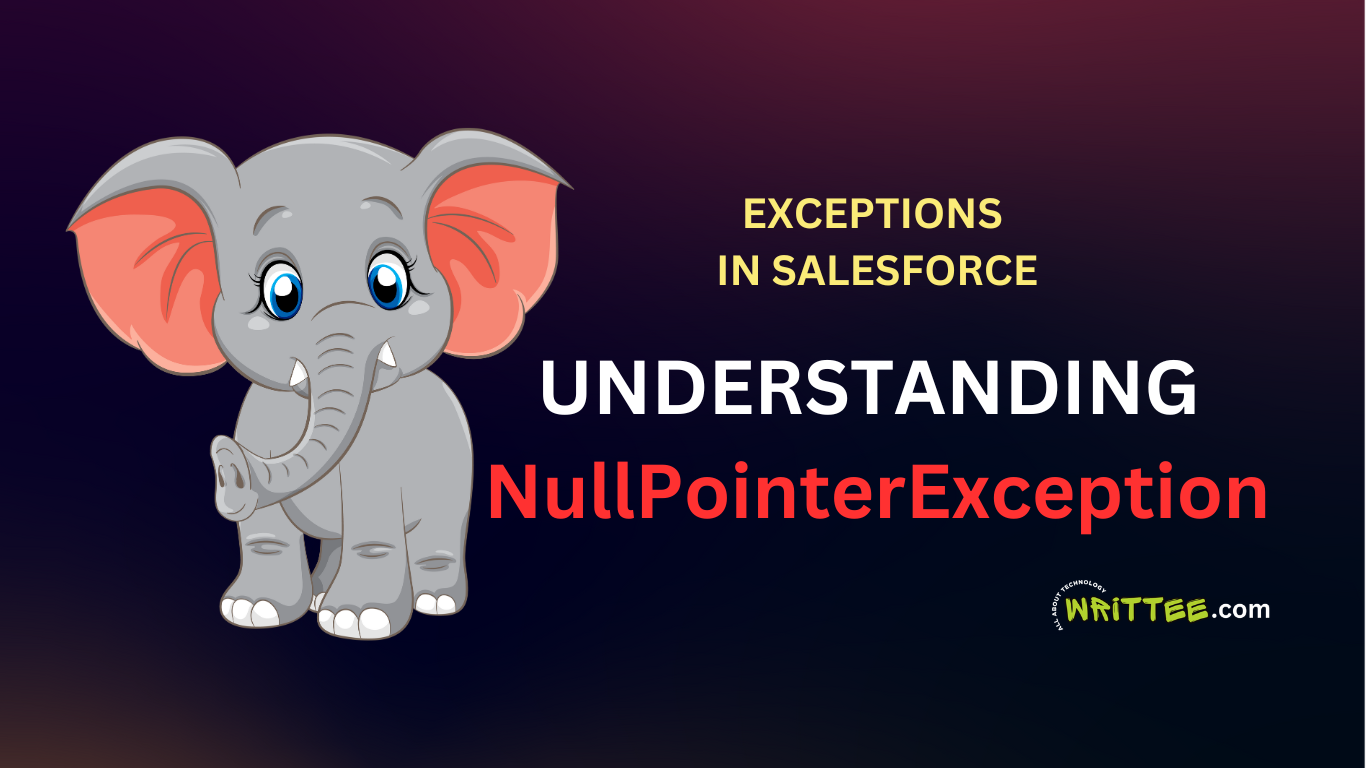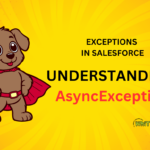Introduction
A NullPointerException is one of the most common runtime errors in Salesforce Apex. It occurs when your code attempts to perform an operation on a variable or object that is null (i.e., not initialized).
In simpler terms, it means you’re trying to use something that hasn’t been properly set up yet.
In this blog, we will explore:
- What is a NullPointerException?
- Common causes.
- Examples of NullPointerException in Apex.
- Techniques to prevent and handle this error.
- Best practices to avoid NullPointerException
1. What is NullPointerException?
A NullPointerException occurs when your Apex code tries to:
- Access a property of a null object.
- Call a method on a null object.
- Perform operations on a null variable.
Why Does This Happen?
In Salesforce, an object must be initialized before it can be used. If the code doesn’t properly check or initialize variables, a NullPointerException is thrown when the variable is accessed or manipulated.
2. Common Causes of NullPointerException
Here are the most frequent scenarios where a NullPointerException can occur:
a. Accessing a Property of a Null Object
When an object is null, trying to access one of its properties will result in an error.
b. Calling a Method on a Null Object
Calling a method on an uninitialized object throws a NullPointerException.
c. Referencing Null Collections
If a List, Set, or Map is null, performing operations like adding or iterating on it causes this exception.
d. SOQL Query Returning No Results
If a SOQL query using SELECT … INTO syntax returns no results, the assigned variable is null.
e. Mismanagement of Optional Data
Not handling optional fields or relationships in records retrieved from Salesforce can lead to null references.
Now, lets discuss with examples on all of the above mentioned points.
3. Examples of NullPointerException in Apex
Example 1: Accessing a Property of a Null Object
public class NullExample {
public static void runExample() {
Account acc = null; // The object is not initialized
System.debug(acc.Name); // Throws NullPointerException
}
}
- Cause: The acc object is null, so accessing acc.Name fails.
- Fix: Ensure the object is initialized before accessing its properties.
Example 2: Calling a Method on a Null Object
public class NullMethodExample {
public static void runExample() {
Account acc = null;
acc.setName('Test'); // Throws NullPointerException
}
}
- Cause: The setName method is called on a null object.
- Fix: Check if the object is null before invoking methods.
Example 3: Referencing a Null Collection
public class NullCollectionExample {
public static void runExample() {
List<String> names = null;
names.add('Test'); // Throws NullPointerException
}
}
- Cause: The names list is null, so the add method fails.
- Fix: Initialize collections before using them.
Example 4: SOQL Query Returning No Results
public class NullSOQLExample {
public static void runExample() {
Account acc = [SELECT Id, Name FROM Account WHERE Name = 'NonExistent']; // No record found
System.debug(acc.Name); // Throws NullPointerException
}
}
- Cause: The query returns no records, so acc is null.
- Fix: Use a try-catch block or check the query result for null.
Example 5: Mismanagement of Optional Data
public class NullFieldExample {
public static void runExample() {
Account acc = [SELECT Id, Parent.Name FROM Account WHERE Name = 'Test'];
System.debug (acc.Parent.Name); // Throws NullPointerException if Parent is null
}
}
- Cause: The Parent relationship may be null.
- Fix: Check for null before accessing child or related fields.
4. How to Prevent NullPointerException
a. Null Checks
Always check if an object or variable is null before accessing its properties or methods.
if (acc != null) {
System.debug(acc.Name);
}
b. Initialize Objects and Collections
Ensure that all objects and collections are initialized before use.
List<String> names = new List<String>();
names.add('Test'); // Safe to use
c. Handle SOQL Query Results
For queries that might return no records, use a try-catch block or check for null.
Account acc = [SELECT Id, Name FROM Account WHERE Name = 'NonExistent' LIMIT 1];
if (acc != null) {
System.debug(acc.Name);
} else {
System.debug('No record found.');
}
d. Use Safe Navigation Operator (Optional in Some Scenarios)
The safe navigation operator (?.) prevents null pointer errors by safely accessing properties or methods of null objects.
System.debug(acc?.Name); // Returns null if acc is null
e. Validate Optional Relationships
Check for null before accessing related fields in Salesforce records.
if (acc.Parent != null) {
System.debug (acc.Parent.Name);
}
5. Best Practices to Avoid NullPointerException
1. Always Initialize Variables:
Assign initial values to variables or use constructors to ensure objects are ready for use.
2. Avoid Hardcoded Assumptions:
Don’t assume records or fields will always have values.
3. Use Defensive Programming:
Write code that anticipates null values and handles them gracefully.
4. Leverage Try-Catch Blocks:
Catch and log NullPointerException for better debugging.
5. Implement Robust Testing:
Write test cases to cover edge scenarios like null values in data.
6. Real-World Scenario
Scenario: Account with Related Contacts
You want to retrieve an account and its related contacts, but there’s a risk that the account might have no contacts.
public class AccountService {
public static void getAccountDetails(String accountId) {
Account acc = [SELECT Id, Name, (SELECT Id, Name FROM Contacts) FROM Account WHERE Id = :accountId];
if (acc != null) {
System.debug('Account Name: ' + acc.Name);
if (acc.Contacts != null && !acc.Contacts.isEmpty()) {
for (Contact con : acc.Contacts) {
System.debug('Contact Name: ' + con.Name);
}
} else {
System.debug('No contacts found for this account.');
}
} else {
System.debug('Account not found.');
}
}
}
How It Works:
- The if (acc != null) condition ensures the account exists.
- The if (acc.Contacts != null && !acc.Contacts.isEmpty()) condition prevents null pointer errors when accessing related contacts.
7. Conclusion
NullPointerException is a common error that can disrupt code execution if not handled properly.
By understanding its causes and implementing preventive measures like null checks, initialization, and defensive programming, you can write robust and error-free Apex code.

















